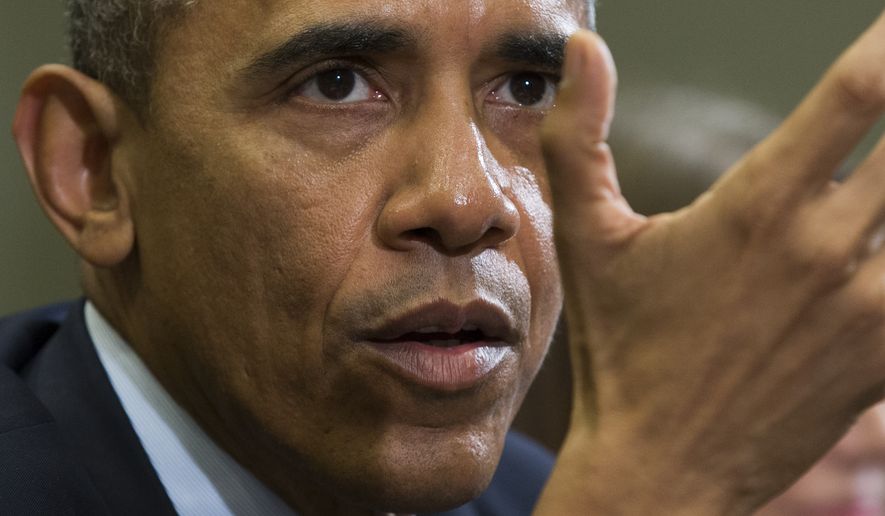A top adviser to Libya’s prime minister warned Tuesday that the Obama administration and the U.S. intelligence community have dramatically underestimated the Islamic State’s expansion into his nation — a development that could have been avoided had Washington led a more aggressive counterterrorism strategy after Moammar Gadhafi’s ouster in 2011.
Expanding ties in recent months between Libyan extremist groups and Abu Bakr al-Baghdadi’s Syria- and Iraq-based Islamic State movement have attracted more international attention during recent weeks. But U.S. officials have resisted playing up the association — even after an outfit claiming allegiance to al-Baghdadi killed a U.S. citizen in an assault on Tripoli’s Corinthia Hotel last week.
“If help had been coming for the last four years, we wouldn’t have this problem,” Aref Ali Nayed, the nation’s ambassador to the United Arab Emirates and a top adviser on security policy to Libyan Prime Minister Abdullah al-Thinni, said in an interview.
He said the arrival of al-Baghdadi’s movement — also known by the acronyms ISIS and ISIL — shows how the threat has grown since the U.S. effectively withdrew after the September 2012 attack that killed U.S. Ambassador J. Christopher Stevens and three other Americans.
“After Chris Stevens’ death, instead of being re-energized to not let him die in vain, there’s been a reluctance to have anything to do with Libya,” Mr. Nayed said.
He said he was not blaming the Obama administration or delivering an official message from the al-Thinni government, but he stressed in an interview that moderates in Libya’s struggling government have been unable “to stop the growth of extremism, and the net result is that we now have an infestation of ISIS that is not only threatening Libya, but the entire region and our European neighbors.”
SEE ALSO: Lindsey Graham calls for 10K U.S. ‘boots on the ground’ to battle Islamic State
Mr. Nayed was in Washington on Tuesday to promote the Libya Institute for Advanced Studies, a civil society group that he and others created in 2013 with the goal of promoting freedom and democracy among younger Libyans.
He suggested that U.S. officials need to be more honest about the growing threat of extremists in Libya.
U.S. intelligence officials, who have been willing to speak only on the condition of anonymity, argue that the Islamic State’s only true foothold in Libya is in the port town of Derna.
But Mr. Nayed said Islamic State-aligned fighters control territory in as many as six Libyan cities and towns, including Tripoli, Sabratah, Sirt and Zilten, and have heavy influence in jihadi training camps near the nation’s southern borders with Niger and Chad.
“These are not just pockets, but nodes in a network sharing weapons, fighters, money and command and control,” he said. The groups are in direct contact with al-Baghdadi’s main operation in Syria and Iraq, with “hundreds upon hundreds of fighters” moving easily among Syria, Iraq and Libya.
Mr. Nayed said other Islamist factions controlling several of Libya’s airports are facilitating a flow of fighters between Tripoli and Turkey. From there, he said, the fighters move easily in and out of Syria despite Turkish claims that they have cracked down on such activity.
Destination point
One U.S. intelligence official, speaking on background, said Mr. Nayed may be overstating the links between al-Baghdadi’s operation in Syria and Libya, but private analysts said the Libyan official’s claims may have merit.
Andrew L. Engel, a jihadi analyst at the Washington Institute for Near East Policy, said groups affiliated with the Islamic State’s rise in Libya have gained significant momentum in recent months.
“Libya used to primarily be a staging point for international jihad,” said Mr. Engel. “Now it’s becoming a destination point for jihad. If you think it’s bad now, just wait.”
What is not clear is the extent to which al-Baghdadi is pulling strings in Libya. After declarations of allegiance from Derna in November, the Islamic State leader is believed to have ordered one of his rising followers in Syria — a Yemeni with the nom de guerre Abu al-Baraa al-Azdi — to serve as the “emir” of the Islamic State-aligned caliphate being established in the northeastern Libyan city.
The move appears to have worked. “Derna now has blue neon ISIL signs glowing from shopfronts and lampposts,” according to a dispatch from Libya published by Politico last week. The dispatch maintained that al-Baghdadi began his push into Libya months earlier by sending a Saudi preacher, Abu Nabil al Anbari, along with a “coterie of ISIL fighters hardened in Syria,” to “spread the ISIL franchise.”
U.S. is ’monitoring’
Islamic State-aligned fighters in recent months have claimed a wave of assaults, capped by last week’s coordinated attack on the Corinthia Hotel that involved at least one car bomb and two heavily armed gunmen. At least 10 people, including a private security contractor and U.S. citizen Cliff Taylor, were killed in the Jan. 27 attack.
State Department spokeswoman Jennifer Psaki told reporters that U.S. officials were “monitoring closely indications that several extremist groups in Libya have aligned themselves openly with ISIL,” but they declined to elaborate.
Asked whether U.S. officials were downplaying the Islamic State threat to his country, Mr. Nayed said, “I think it is understated and underestimated and, because of the underestimation, there is no real strategy for dealing with it.
“This is extremely dangerous because Libya is in the midst of everything [geographically],” he said. “This poses a danger for our neighbors like Egypt and Tunisia and Algeria, Chad and Niger. It also poses a danger across the Mediterranean to Greece, Italy and France and Malta.”
• Guy Taylor can be reached at gtaylor@washingtontimes.com.




Please read our comment policy before commenting.